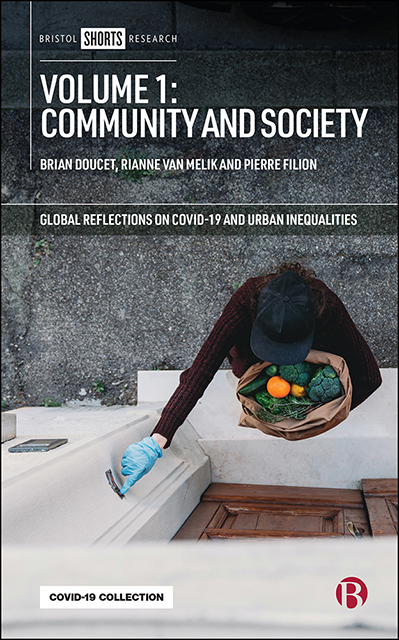Book contents
- Frontmatter
- Contents
- List of Figures and Tables
- Notes on Contributors
- Acknowledgments
- Preface to All Four Volumes of Global Reflections on COVID-19 and Urban Inequalities
- One Introduction
- Part I Working Practices
- Part II Life During Lockdown
- Part III Migration, Migrants, and Refugees
- Part IV Age, Race, Gender, and Ability
- Index
Three - The Man and the Scooter: How the Low-Income Worker Helps Save a Locked-Down City
Published online by Cambridge University Press: 13 April 2023
- Frontmatter
- Contents
- List of Figures and Tables
- Notes on Contributors
- Acknowledgments
- Preface to All Four Volumes of Global Reflections on COVID-19 and Urban Inequalities
- One Introduction
- Part I Working Practices
- Part II Life During Lockdown
- Part III Migration, Migrants, and Refugees
- Part IV Age, Race, Gender, and Ability
- Index
Summary
Introduction
Within the Gulf Cooperation Council (GCC) countries, the fate of the low-income migratory worker has always been a contested issue (Ewers and Dicce, 2016). Large numbers of migrant workers, mainly originating from South Asian countries, represent an important demographic in the region. In Dubai, the focus of this chapter, the concept of home deliveries has become common in the last few years. Armed with a scooter (a small motorcycle), a vast army of these low-income workers delivers goods quickly to homes across the city. Smartphonebased apps and third-party delivery operators have made this phenomenon even more wide-spread in recent years (Johnson, 2014). It is common to see these small scooters maneuvering traffic continuously, with their numbers growing steadily.
Early in the COVID-19 pandemic, cities in the United Arab Emirates (UAE) went into a strict lockdown and near-curfew conditions. Residents stayed indoors, and society came to a complete halt, similar to other countries around the world. In addition to emergency services and the construction sector, delivery services were some of the few expected to continue working and serving the residents during the lockdown. The delivery scooters were suddenly the lifeline of the city. Drivers continued to deliver goods to the city's residents, despite the obvious concerns for their own health.
This chapter argues that the COVID-19 pandemic magnified existing socio-economic divides and put them on full display. Vulnerable migrant-laborers had no option but to continue working at a time of great uncertainty, especially since much was still unknown about the virus, how it spreads, and its potential treatments. Similar to other urban poor around the world, they bore the brunt of the virus in order to make a living (see Part III). This chapter sheds some light on migration and urban inequality in the Gulf. It then highlights the added pressures of the pandemic as it disproportionately impacts the lower-income segments within Dubai.
Urban inequality in the Gulf
The Gulf states have a long history with migration. Throughout the early history of the region, labor-flows from Iran and the Indian subcontinent were common. With the oil discoveries and the oil boom in the 1960s and 1970s, the drive to build and develop became instant.
- Type
- Chapter
- Information
- Volume 1: Community and Society , pp. 31 - 40Publisher: Bristol University PressPrint publication year: 2021



